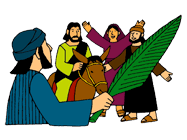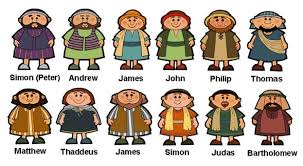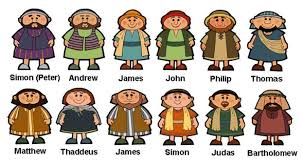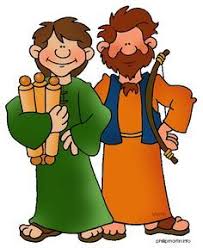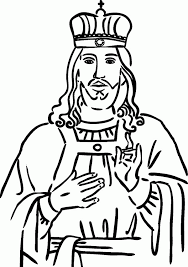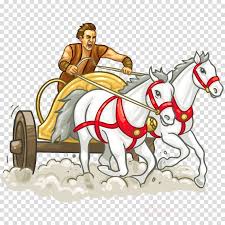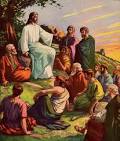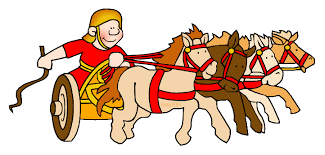Zechariah 9:14 –Then the Lord will appear over them, and his arrow will go forth like lightening; the Lord God will sound the trumpet and will march forth in the whirlwinds of the south.
We are continuing our study of Zechariah chapter 9. In our previous post, we saw that the Lord gave his people words of hope regarding the coming of the Messiah, who would bring both Jews and Gentiles into the family of God.
 He also gave promises of strength, hope and safety to the nation of Israel, who would steward the promise of the Messiah for many years to come.
He also gave promises of strength, hope and safety to the nation of Israel, who would steward the promise of the Messiah for many years to come.
In verse 13, God said that he would bend Judah as a bow and fill it with Ephraim. This war-like analogy has a double meaning.
On the one hand, it refers to the victory of the church as she spreads the gospel message to the outermost parts of the earth, overcoming all satanic opposition.
On the other hand, it refers to the physical victory of Israel over her enemies. This has been seen countless times over the course of history, and we can expect to see it in the future as well, because God will always defend the Jews and bring them victory.
This analogy of victory in war (both spiritual and temporal) continues through the remainder of chapter nine. While history reveals partial fulfillments of this prophetic word, most scholars believe that its ultimate fulfillment will take place during the great tribulation.
God has already bent Judah as a bow and placed Ephraim as an arrow (verse 13). Now Zechariah prophesies that the Lord ‘will appear over’ his people. What does that mean?
Let’s begin our explanation with a general observation about war. When two unequal armies engage in warfare, we expect the army which is bigger, more highly trained and better equipped to win the battle. Because this is what we expect to take place, no one takes any undue notice when it happens.
Occasionally, a less well equipped or less skilled army may defeat an opponent, if that opponent becomes careless or makes mistakes. If this happens, we normally attribute victory to the inefficiency of the larger army, rather than the strength of the smaller army.
But when a smaller, less equipped, less skilled army defeats an opponent at the height of their power and might, people take notice. They will call it a miracle. They will say it is an example of the power of God.
This is what the prophet means when he says the Lord ‘will appear over’ his people. Either the Jews will conquer enemies that are much greater than themselves or they will win victory over their enemies in an unusual way.
For example, in II Kings 3, we have the account of Jehoshaphat (king of Judah), Jehoram (king of Israel) and the king of Edom banding together to war against Moab. After a seven day march, the entire army was completely out of water. Death was on the near horizon for the entire alliance.
But King Jehoshaphat sought the Lord through the prophet Elisha. God answered by telling the men to dig numerous ditches throughout the valley. God promised that in the morning, he would fill them with water:
2 Kings 3:17-18 -For thus says the LORD, You shall not see wind, neither shall you see rain; yet that valley shall be filled with water, that you may drink, both you, and your cattle, and your animals.And this is but a light thing in the sight of the LORD: he will deliver the Moabites also into your hand.
Of course, victory occurred exactly as the Lord said it would. This is an example of how God gave his people victory in an unusual way.
Another example was when God parted the Red Sea so Moses and the Israelites could walk across on dry land, while the Egyptian army drowned as the waters began to flow once again.
The point is that regardless of how the victory occurs, the world will ‘see’ or acknowledge that God was involved in it. We might put it this way: the Lord shall be seen conspicuously manifesting his power over the enemies of Israel. When this happens, he will receive the glory for the victory.

During these battles, the Lord’s arrows will go forth as lightning. Scripture often refers to lightning as the arrows of God (Psalms 18:14, 77:17). These arrows are the judgments God inflicts upon his enemies (such as the ten plagues).
Just as lightening scatters and discomfits all in its vicinity, so God will scatter and discomfit the enemies of his people striking fear into the hearts. Just as lightening causes instantaneous destruction to whatever it touches, so the arrows of God will hit their mark and destroy those who oppose Israel.
Zechariah also tells us that the Lord God will sound the trumpet. In ancient Israel, trumpets were used to call the men to war (Jeremiah 4:5, 6:1).
In addition, Israel was to sound the trumpet at the beginning of the battle. God promised that when this was done, he would take immediate notice and give them victory (Numbers 10:9). Of course, we know that God was/is always aware of the armies of Israel. By having them blow the trumpet, it reassured the men that God was right there with them; it increased their faith and bravery in battle.
In this case, God will sound the call for his people to flock to his banner and begin to wage war. God will also lead the war and direct the charge while infusing fresh courage into his people.
God also declares that he will march forth in the whirlwinds of the south. A whirlwind is a very ferocious storm characterized by a spiral motion of air (tornado). In the middle east, these storms often arise from the Arabian desert.
Whirlwinds are violent and immensely powerful; nothing can stand in their path. In the same way, God will violently and powerfully cut a swath of destruction through the enemies of his people. No one will stand against him or against Israel. The nation who foolishly places themselves in the path of God’s vengeance will reap destruction.
Again, this has already been seen in the history of Israel and most bible commentators believe this describes some very real battles which will take place in the future –during the tribulation period, most likely at or around the 3 ½ year mark, when the antichrist breaks his treaty with Israel (Daniel chapter 7).
Of course, we see the spiritual parallel of this prophesy fulfilled in God’s partnership with the church.
Scripture tells us that God exalted Jesus, giving him power and authority over all things including the church:
Ephesians 1:22 – And has put all things under his [Jesus] feet, and gave him to be the head over all things to the church.
Jesus is the head of the church; we are his hands and feet in the world. We partner with him to spread the gospel message and enforce his will on the earth. As the head, Jesus leads, guides, protects and makes provision for his body, the church.
The Lord appeared to the apostles during the time of his incarnation, and after his death and resurrection. We can still ‘see’ him appearing over the church today, through our spiritual eyes of faith.
Ever since the resurrection, Christianity has won victory after victory over all the forces that opposed it because Jesus fights on behalf of the church through both natural and supernatural means.
His arrows of conviction fly forth, discomfiting sinners and drawing them to himself in the midst of their fear and shame. Just as lightening causes instant destruction of anything it touches, the powerful blood of Christ demolishes every sin when a person becomes a believer.
God also sounds his trumpet over his followers, particularly the trumpet of jubilee. The year of jubilee was signaled by a blast of trumpets throughout the land of Israel (Leviticus 25:39-54). During that year, the land was to rest (be fallow), all property/land that exchanged hands was returned, all enslaved Israelites were set free, and all debts were remitted.
The spiritual sounding of the trumpet in this prophesy speaks to a time when God calls forth a great time of revival where sinners are set free through the blood of Christ. Just as there was immense joy and celebration during the year of jubilee, there will be great joy and celebration when revival comes to the world. Those who are set free from the slavery of sin won’t be able to stop rejoicing and praising God!
At that time the gospel will go forth with the power and energy of a whirlwind, because it will be energized by Holy Spirit. It will cut a swath of destruction across the kingdom of darkness, blowing away the mists of ignorance/lies that Satan has used to bind sinners. Instead, they will experience the fresh wind of Holy Spirit, and return to Christ.
Zechariah 9:15 – The Lord of hosts will protect them, and they shall devour, and tread down the sling stones, and they shall drink and roar as if drunk with wine, and be full like a bowl, drenched like the corners of the altar.
The Lord of Hosts is the God of all power; nothing is impossible for him. No person, or nation or spirit can challenge him. When the Lord of Hosts promises to protect his people, you can count on the fact that it is going to happen!
This promise was part of the original blessing that God gave to Abraham when he first made the covenant with him:
Genesis 15:1 - After these things the word of the LORD came unto Abram in a vision, saying, Fear not, Abram: I am your shield, and your exceeding great reward.
Almighty God not only promises to protect Israel, but he also promises that Israel would devour, tread down the sling-stones, and drink/roar as if drunk with wine. What does that mean?
Devour – The prophet does not tell us exactly what Israel is going to devour. This indicates a broader meaning of the word; it refers to destruction or absorption.
For instance, in Deuteronomy 7:16, Israel is going to “consume all the people whom the Lord your God shall deliver to you”. In Numbers 14:9, Joshua and Caleb describe the Canaanites by saying, “They are our bread”. 
The overall meaning is that although Israel was in a humble state during the time of Zechariah, the day will come when Messiah shall rule and at that time any nation that opposes God’s people will either be absorbed into God’s kingdom or destroyed.
Tread down the sling-stones – In ancient times, sling shots were formidable weapons. During the era of the judges, the tribe of Benjamin had a very skilled contingent of men who used the sling shot in battle:
Judges 20:16 - Among all this people there were seven hundred chosen men, left handed; every one could sling stones at a hair's breadth, and not miss.
In this prophesy, ‘treading down the sling stones’ means that the children of Israel will calmly and safely walk over all the stones their enemies have slung at them in battle, because all of those projectiles missed their mark. In other words, their enemies aimed and fired at them multiple times, but never hit them. The stones are no longer things to be feared;now they lie harmless on the ground. Almighty God, the shield of his people, will make sure this happens.
This may also be a reference to David, who slew Goliath of Gath, a giant. Goliath was big, well-armed and experienced in battle. Davidwas small, completely vulnerable and had no formal military experience. Yet, because God was on his side, he was victorious over his enemy.
Those who hold this view believe it speaks to the power of God in the defeat of Israel’s enemies. Israel is weak, but no matter how impossible the odds are, she can defeat her enemies because God is fighting on her behalf.
Drink and roar as if drunk with wine –This is a very interesting phrase.Some scholars believe it describes a time of joyous celebration which God’s people will experience after their enemies are subdued.
As with any celebration, there will be fellowship, feasting and joy. God’s people will beenjoying the spoils they acquired in war. They will be feasting on their portion of the fellowship offerings and offerings made for thanksgiving to the Lord.
Other scholars picture Israel as a lion, roaring and drinking the blood of her prey just as a lion would do in the wild.
Both interpretations are apicture of Israel defeating her enemies and giving glory to the Lord for the victory (Numbers 23:24, Micah 5:8).
God’s people are also described as being ‘full like a bowl and drenched like the corners of the altar’. Although this seems strange to us, it is a reference that would immediately be understood by the Jews because it refers to the workings of the temple.
When a sacrifice was made in the temple, the priests would collect the blood of the sacrificial animal in a bowl. They would then sprinkle that blood on the horns which adorned the four corners of the brazen altar. The rest of the blood would be poured out at the base of the altar (Exodus 29:12, Leviticus 4:18).
This phrase may refer to the vast amount of blood that will be found in the temple because the number of offerings was so great that the bowls were full and the altar was drenched.
The phrase may also mean that the armies of Israel would be the consecrated instruments of God; they would prevail for his purposes and causes. As such, they would be holy like the bowls of the temple.
Again, this kind of warfare has been seen in limited circumstances in the history of Israel. It was evident when God rescued Israel from Egypt, it was evident when God gave them possession of the Promised Land and it was evident when Israel was victorious over her enemies at the time of the Maccabees.
However, bible scholars predict a full/complete fulfillment when Israel is at war with the armies of the antichrist during Armageddon.
Spiritually speaking, the Lord is a shield which fully surrounds and protects the church. He protects us against Satan, against the power of temptation, against the opposition of this world, against all demonic spirits of sickness/disease/lack, and the rage of sinful men. 
This was very apparent when God’s hand of protection was seen over his 12 apostles who were delivered time and time again so they could fulfill their ministry of spreading the gospel message and establishing the church.
We can point to examples of this protection in every generation (including our own lives) as God works through the church to add new members to the kingdom of heaven.
Israel ‘devoured’ or consumed/conquered all the people God delivered into their hands. So the church will devour spiritual food – the word of God which is the bread of life (Luke 4:4). Filled with the nourishment of the word and led by Holy Spirit, the church will ‘devour’ the kingdom of darkness by ministering the gospel to a lost and dying world.
Ephesians 5:18-20 -And be not drunk with wine, in which is excess; but be filled with the Spirit; speaking to yourselves in psalms and hymns and spiritual songs, singing and making melody in your heart to the Lord; giving thanks always for all things unto God, even the Father, in the name of our Lord Jesus Christ;
Although it seems foolish and inadequate by the world’s standards, the preaching of the gospel will devour/destroy the kingdom of darkness just as Goliath was destroyed by the sling-stone of David.
As the church experiences great victory, she will celebrate by offering God sacrifices of praise and thanksgiving right now and in the years to come.
In the next age, there will be great celebration, which includes rejoicing, fellowship and feasting. The cause of this celebration will be the church’s victory over the devil. At that time, we will be totally free from the effects of sin. We will live forevermore in the company of our great Savior and King, Jesus Christ.
Zechariah 9:16 – On that day the Lord their God will save them, as the flock of his people; for like the jewels of a crown they shall shine on his land.
God continues to reinforce the idea that his people would be victorious through him. He is not only a shield to defend, but a sword to gain victory; he is the Lord of Hosts who is the source of all power and authority.
God now exchanges the image of war and bloodshed for that of a shepherd and his sheep because God not only assures victory, he gives lasting peace.
Because of the covenant promises, Israel was God’s flock. Just like sheep, they have no real strength, wisdom or power of their own.In the day of trouble, it will be God who saves them, for he is the great shepherd. God will lead, protect and provide for his flock, leading them beside the still waters where they will have peace and security (John 10, Psalms 23).
God also exchanges the imagery of violent sling stones for that of precious jewels. The imagery suggests various possible meanings:
One, it might indicate that God adorns his royal diadem with them:
Isaiah 62:3 -You shall also be a crown of glory in the hand of the LORD, and a royal diadem in the hand of your God.
(See also Malachi 3:17).
This explanation certainly makes sense, as the glory of God is demonstrated in his redemption of love of mankind.
Two, it may refer to the jewels which adorn the official garments of the high priest (Exodus 28:15-21).
This also makes sense. The 12 jewels on the high priest’s official clothing represented the 12 tribes of Israel. This meant that God was continually looking upon his people as precious stones. In other words, the people of God were/are of great value to him.
Three, it may refer to a pile/heap of stones or a memorial stone. These were often erected in Israel to commemorate great moments in the relationship between God and his people.
One such instance can be found in Genesis 28, when Jacob erected a pillar or memorial stone to the Lord at the place where he had his vision of the ladder reaching to heaven with angels ascending and descending upon it.
Another example would be the stone memorial that Israel built when God parted the waters of the Jordan so the Israelites could pass over the flooded river on dry ground (see Joshua chapter 4). There are many other instances of memorial stones in scripture. Which ones do you remember?
One thing we know for sure is that God’s followers are highly valued by him (after all, he died to buy us). 
As God’s precious jewels, we will ‘shine on the land’. The beauty of the jewels in a monarch’s crown always catches the attention of people. Likewise, when we reflect the glory and goodness of God, it catches people’s attention and draws sinners to Christ. They will want to experience the same goodness and grace that God has given to us.
Our testimony will not just be limited to this world. The witness of what God has done on planet earth will forever rise as a memorial to all other races or created beings. Just think of it - our redemption will forever bring glory and honor to Jesus Christ!
When can we expect all of this to take place? The prophet tells us ‘In that day’. Spiritually speaking, ‘that day’ began when Jesus arose, and the church was born. It will continue throughout the age of grace.
During this period of time, we will follow our commander-in-chief King Jesus into battle against spiritual forces. By the power of his Holy Spirit, we will come against the kingdom of darkness like a whirlwind, destroying Satan’s lies and setting his captives free so they can enter the kingdom of heaven. Once there, they too will become precious jewels in the sight of our Father.
Joshua 10:8 – And the Lord said to Joshua, “Do not fear them, for I have given them into your hands. Not a man of them shall stand before you.”
Though the people of God fight very real battles both spiritually and literally, victory and deliverance are won by the mighty power of God. No wonder God constantly admonishes us not to fear or be dismayed (Jeremiah 42:11, Psalms 118:6, Deuteronomy 20:1-4, Joshua 10:25, etc)!
Zechariah 9:17 – For how great is his goodness, and how great his beauty! Grain shall make the young men flourish, and new wine the young women.
The goodness and beauty described here belong to God.
The goodness of God could never be adequately described by human words. Goodness is an attribute of God; it is a part of who he is. He does not exhibit goodness; he is the source of it - all good springs from him. He possesses goodness absolutely, without beginning or end, without measure and without limit.
This great goodness is demonstrated in the person of Jesus Christ, our Redeemer. He left the throne room of heaven to reside in a body of flesh; he endured the suffering of the cross that he might become the Mediator between God and man. He bestows on us all the goodness, grace, forgiveness and spiritual/temporal blessings of the Father.
Romans 8:32 – He that spared not his own Son, but delivered him up for us all, how shall he not with him also freely give us all things?
Because of the sacrifice of Christ, we are surrounded and immersed in God’s goodness as if we were lost in a fathomless, bottomless ocean. God’s goodness is available to all his children, and it is limited only by our capacity to receive it. [Hint: Our capacity to receive is limited by our faith.]
As one commentator put it, ‘From God all things sweet derive their sweetness; all things fair, their beauty; all things bright, their splendor; all things that live, their life; all things sentient, their sense; all that move, their vigor; all intelligences, their knowledge; all things perfect, their perfection; all things in any wise good, their goodness.’
Again, we find that there are no words that can express the goodness of our God!
The prophet also speaks of God’s beauty. Beauty refers to the brightness or splendor of God, which appears in all his favors and gifts toward mankind. With this in mind, what could be more beautiful than our Lord and Savior, Jesus Christ! We could praise him forever and never fully give him the glory he is due for all the blessings he has given to us!
This prophesy comes to a close with the promise of the goodness/prosperity of Israel/the land. Specifically, the grain will make the young men flourish and new wine will make the young women flourish.
Both of these blessings indicate plentiful harvests. As we know, there won’t be a harvest without some work first. The young men and women have put forth a lot of time, effort and sweat in sowing, fertilizing, pruning and finally harvesting the grain and grapes.
It is only fitting that the harvest makes them glad, because they are reaping the results of all their hard work.
This is a very encouraging word as it pertains to the harvests of the Jews in the natural realm. They will have an abundance of food and provisions, which will enable them to have peaceful lives and have even more children.
It is also a very encouraging word in the spiritual realm. This promise assures believers that as we put in the work to sow and weed and water the seeds of the gospel message in the lives of others, we will reap an abundant harvest. Once that harvest is collected, we will have great joy knowing that God has worked through us to bring souls into his eternal kingdom of goodness and beauty.
It is astonishing to consider that God has chosen us to assist him in this work! He is truly worthy of all our praise, worship and adoration!
Let me offer you some encouragement and relief:
Over and over in this prophesy God continues to remind his people in different ways that they would be victorious if they trusted in him. Why do you think God said this repeatedly?
I think he did it because of a lack of faith on the part of the Jews. It’s almost as if they got up in the morning believing the promises of God, but once they went out into society, they took their eyes off the Lord and began to focus on the strength and power of their enemies.
If we are honest, we will admit to being guilty of doing the exact same thing sometimes!
How often have we built up our faith by being in church only to go off to work or school the next day and find that our mind is completely focused on the things of the world?
The good news is that we can overcome this lack of faith by repeatedly reminding ourselves of the promises of God. We need to train our minds and hearts to feed off of the truth of the word of God, not the threats, bad news or complaints of the world around us:
Philippians 4:8 - Finally, brethren, whatsoever things are true, whatsoever things are honest, whatsoever things are just, whatsoever things are pure, whatsoever things are lovely, whatsoever things are of good report; if there be any virtue, and if there be any praise, think on these things.
I encourage you to pay close attention to the thoughts that randomly flow through your mind this week. If you find they are evil, negative or faithless, give your spirit some relief by casting those lies away and feeding your mind on the goodness of God!
Let me offer you some strength:
Words can never adequately express the gratitude we feel towards God for his blessings, which flow to us through our Lord and Savior, Jesus Christ.
Thankfully, there are other ways to express our love and devotion.
Perhaps the best way to demonstrate our gratitude is to live a holy life that is pleasing to the Lord. When we seek to circumcise sin from our hearts and do what is righteous in the Lord’s sight, it is an expression of our love, devotion and thankfulness to him.
We can also please God by living in faith (Hebrews 11:6). When he promises to deliver us, to bless us or to give us victory, let’s place our faith in his goodness and power. If we do, he will never let us down!



